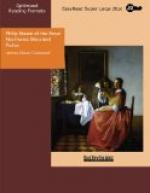He was filled with the craze of fight now and it found vent in a yell of defiance as he spurred on toward the outlaws. They were not going to run. They were waiting for him. He caught the gleam of the hot sun on their revolvers, and saw that they meant business as they swung a little apart to divide his fire. At one hundred yards Philip still held his gun at his side; at sixty he pulled in his mare, flattened along her neck like an Indian, his pistol arm swinging free between her ears. It was one of the cleverest fighting tricks of the service, and he made the movement as the guns of the others leaped before their faces. Two shots sang over his head, so close that they would have swept him from the saddle if he had been erect. In another moment the rockbound chasm echoed with the steady roar of the three revolvers. In front of the flaming end of his own gun Philip saw the outlaw on the right pitch forward in his saddle and fall to the ground. He sent his last shot at the man on the left and drew his second gun. Before he could fire again his mare gave a tremendous lunge forward and stumbled upon her knees, and with a gasp of horror Philip felt the saddle-girth slip as he swung to free himself.
In the few terrible seconds that followed Philip was conscious of two things—that death was very near, and that Billinger was a moment too late. Less than ten paces away the outlaw was deliberately taking aim at him, while his own pistol arm was pinned under the weight of his body. For a breath he ceased to struggle, looking up in frozen calmness at the man whose finger was already crooked to fire.
When a shot suddenly rang out, it passed through him in a lightning flash that it was the shot intended for him. But he saw no movement in the outlaw’s arm; no smoke from his gun. For a moment the man sat rigid and stiff in his saddle. Then his arm dropped. His revolver fell with a clatter among the stones. He slipped sidewise with a low groan and tumbled limp and lifeless almost at Philip’s feet.
“Billinger—Billinger—”
The words came in a sob of joy from Philip’s lips. Billinger had come in time—just in time!
He struggled so that he could turn his head and look down the chasm. Yes, there was Billinger—a hundred yards away, hunched over his saddle. Billinger, with his broken leg, his magnificent courage, his—
With a wild cry Philip jerked himself free.
Good God, it was not Billinger! It was Isobel! She had slipped from the saddle—he saw her as she tottered a few steps among the rocks and then sank down among them. With his pistol still in his hand he ran back to where Billinger’s horse was standing. The girl was crumpled against the side of a boulder, with her head in her arms—and she was crying. In an instant he was beside her, and all that he had ever dreamed of, all that he had ever hoped for, burst from his lips as he caught her and held her close against his breast. Yet he never could have told what he said. Only he knew that her arms were clasped about his neck, and that, as she pressed her face against him, she sobbed over and over again something about the old days at Lac Bain—and that she loved him, loved him! Then his eyes turned up the chasm, and what he saw there made him bend low behind the boulder and brought a strange thrill into his voice.




